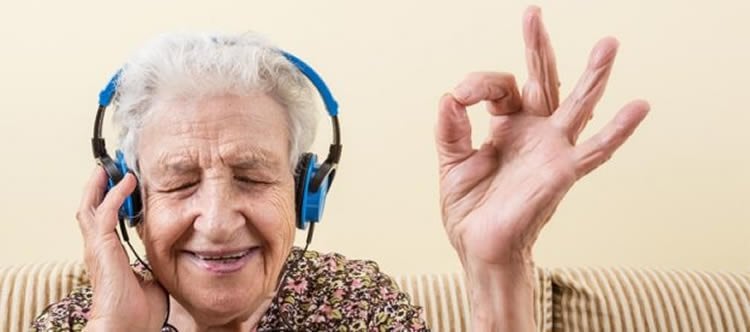Summary: Combining non-invasive brain stimulation with a person’s favorite music from the past may help to activate old memories and improve mood for older patients with MCI, a new study reports.
Source: Baycrest.
Baycrest will embark on the first study combining music therapy with brain stimulation to improve memory among patients with Mild Cognitive Impairment (MCI).
This study could pave the way to developing an affordable and easy-to-use treatment for MCI patients, who face a higher risk of developing Alzheimer’s disease.
Dr. Claude Alain, assistant director and senior scientist at Baycrest’s Rotman Research Institute (RRI), will work with MCI patients to study the benefits of listening to music they enjoyed in the past, paired with Transcranial Direct Current Stimulation (tDCS) – a non-invasive and painless form of brain stimulation that transmits a very low-intensity current through the skull.
Research has demonstrated that listening to music improves the mood and well-being of older adults with dementia, and may also stimulate social interaction by “bringing back” past memories for these patients.

“Somehow music activates memories in dementia patients, which in turn leads to more social engagement and interaction with caregivers,” says Dr. Alain, who is also a psychology professor at the University of Toronto. “Brain stimulation has also been shown to temporarily improve a person’s memory and attention, but the reason it helps is still unclear.
“By combining personalized music choices with tDCS, we aim to strengthen the unique brain pathway music uses to activate memories and improve the effectiveness of this musical intervention among patients who are starting to experience memory issues.”
There are few treatments available to improve or slow down memory decline among MCI patients.
Currently, the study is recruiting older adults with mild cognitive impairment. Anyone interested in participating can visit here or leave a message at: 416-785-2500 ext. 2080.
Funding: This research is supported by the Lorraine Johnston Foundation, which aided in the study’s development and contributed funds towards hiring staff and conducting testing in older adults with MCI.
With additional funding, researchers could pursue studying the brain mechanisms behind brain stimulation. Depending on the study’s results, there is the potential to develop a treatment program for patients with more severe types of dementia.
Source: Jonathan MacIndoe – Baycrest
Image Source: NeuroscienceNews.com image is adapted from the Baycrest news release.
[cbtabs][cbtab title=”MLA”]Baycrest “Study Combines Music and Brain Stimulation to Improve Memory.” NeuroscienceNews. NeuroscienceNews, 22 September 2017.
<https://neurosciencenews.com/brain-stimulation-music-memory-7550/>.[/cbtab][cbtab title=”APA”]Baycrest (2017, September 22). Study Combines Music and Brain Stimulation to Improve Memory. NeuroscienceNews. Retrieved September 22, 2017 from https://neurosciencenews.com/brain-stimulation-music-memory-7550/[/cbtab][cbtab title=”Chicago”]Baycrest “Study Combines Music and Brain Stimulation to Improve Memory.” https://neurosciencenews.com/brain-stimulation-music-memory-7550/ (accessed September 22, 2017).[/cbtab][/cbtabs]







